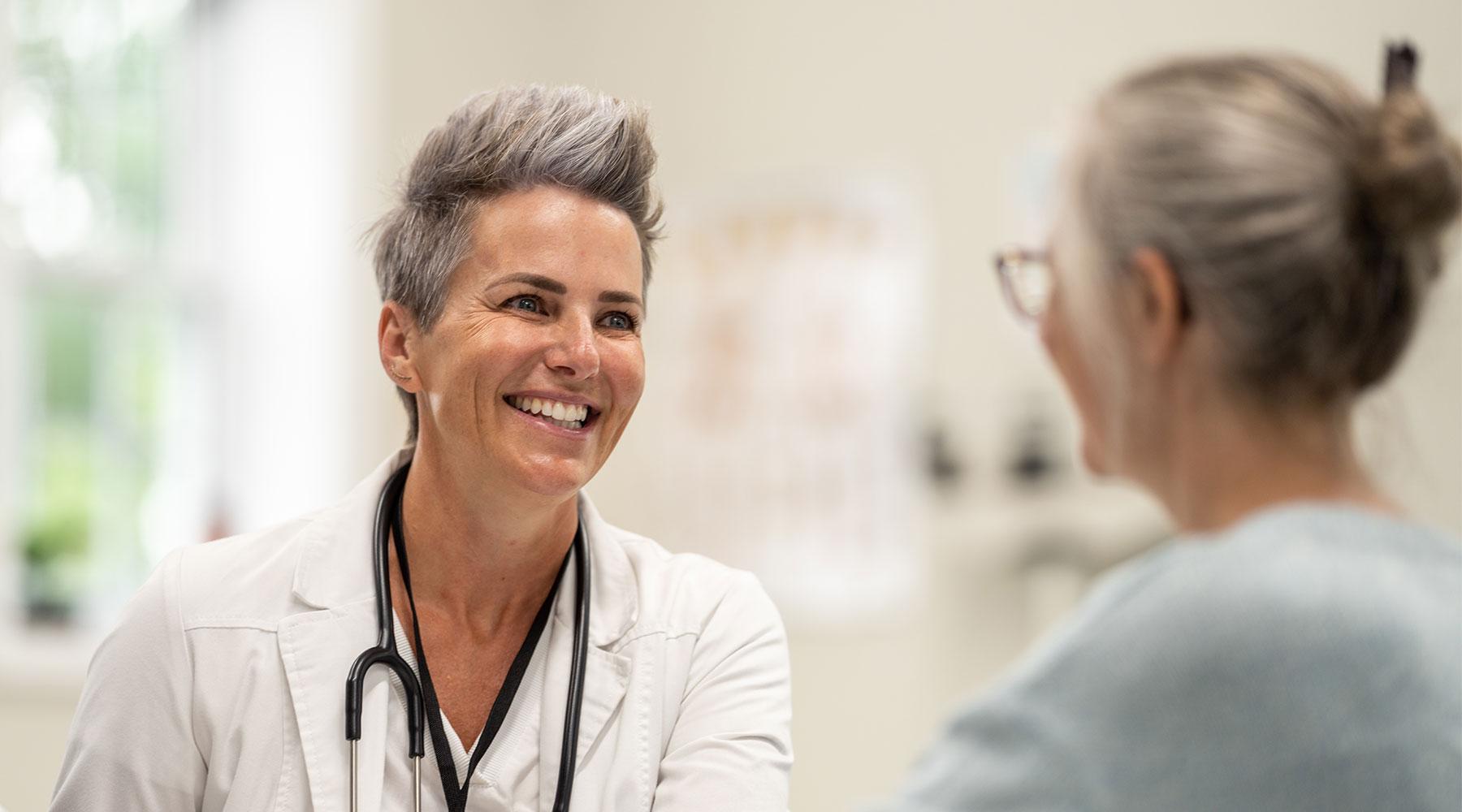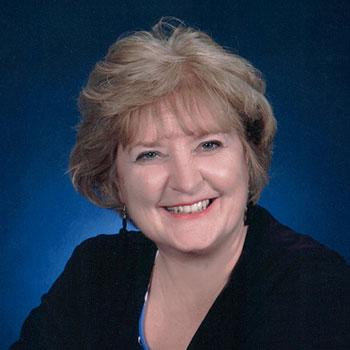
Propel Your Career Forward with the DNP
Ohio University's MSN-DNP program is for working professionals who require flexibility, and who aspire to achieve advanced practice, education, and leadership roles. With two specialization options and a curriculum that teaches both the necessary practical and soft skills, you will graduate capable of stepping into the next stage of your career with confidence, while maximizing your potential for a top salary in your field.
Accreditation
The master's degree program in nursing, Doctor of Nursing Practice program and post-graduate APRN certificate program at Ohio University is accredited by the Commission on Collegiate Nursing Education .
Program Benefits
- No GRE/GMAT Required
- Part-time schedule
- Online coursework and On-Campus Intensives
- 1,000 clinical practicum hours
- On-campus intensives (OCI)

Set Yourself up for Career Growth as a DNP
Regardless of your chosen path—advanced practice, nursing education, or leadership roles—you position yourself for myriad opportunities when you pursue the MSN-DNP degree, including 40% job growth in a variety of disciplines by 2031, and potential salaries of more than $123,000 1 .
DNP Careers
A Curriculum Built for Success
36 Credits | Part-time curriculum | 1,000 clinical/practicum hours
The MSN-DNP curriculum helps you build your understanding of key concepts in advanced nursing and foster the leadership qualities you need to teach, inspire confidence in patients, and take charge of your teams.
Classes are offered in a blended format, including both online coursework and periodic on-campus intensives (OCIs) at the Athens or Dublin Campus to engage in interactive, interprofessional activities, while learning from faculty, expert leaders in the field and peers.
Course Highlights:
- Professional Presence, Informatics for Advanced Nursing Practice
- Health Policy and Advocacy for Advanced Nursing Practice
- Epidemiology and Population Health for Advanced Nursing Practice
Begin the Journey to Your DNP
No GRE/ GMAT Required | Transfer Up to 9 Credits
As you begin your application, here are key admission requirements to keep in mind:
Fall 2026:
- Application Deadline: 07/06/26
- Classes Begin: 08/24/26
- Awarded Master of Science in Nursing (MSN) from a regionally accredited institution
- Minimum cumulative GPA of 3.20 for unconditional admission
- Official transcripts for all previously attended undergraduate and graduate institutions
- Professional Goals Statement (written in APA sixth edition style) and 1-2 pages in length
- Resume or CV
- 3 letters of recommendation from individuals who can evaluate your ability to complete graduate academic work, such as a nurse manager, previous nurse faculty, or supervisor. A minimum of two references should be from individuals prepared at the graduate level. If you are also seeking an Advanced Practice Registered Nurse (APRN) certificate, one letter should be from an APRN
- Resident of and evidence of valid, unrestricted RN licensure in an approved state. A current list of approved states can be found on our DNP admissions page
- A web-based admission interview with faculty
- Application fee of $50
Students should be prepared to provide documentation of any national certifications, such as an APRN, Nurse Executive, etc.
Upon admission, students should also be prepared to provide documentation of any precepted practicum/clinical hours earned through a graduate nursing program.
Prior to clinical/practicum experiences, students must also provide proof of the following:
- Specified health status requirements (immunization status, TB screening, etc. as delineated in the current Graduate Nursing Student Handbook);
- State and Federal background checks free from disqualifying offenses
- Malpractice insurance. Students in the APRN program tracks are required to have nurse practitioner malpractice insurance; students in the Nurse Leader/Executive or Nurse Educator program track are required to have registered nurse malpractice insurance. Insurance provided by the employer is not acceptable.
When considering an online program that leads to a professional license in a state other than Ohio, it is highly recommended that prospective students contact the appropriate licensing agency in that state to seek information and additional guidance before beginning the program.
Invest in Your Nursing Career
$23,688 Total Tuition (Resident) | $658 Per Credit Hour (Resident) | Graduates can earn more than $120,000 1
When you invest in the MSN-DNP program, you not only benefit from a well-rounded education that is conceptual as well as hands-on, you gain a mark of excellence in the form of an Ohio University degree. Our students are considered a preferred employee by many top healthcare agencies.
Financial Aid
OHIO is committed to offering affordable, competitive tuition and has been recognized for the fourth consecutive year as a best-value university by U.S. News and World Report. In addition, student veteran, active military members, alumni, and corporate partners are automatically eligible to receive a 15% scholarship. Depending on your background, costs and credit hours will differ.
-
In-Person, Hands-On Experience
While the MSN-DNP offers the flexibility of a part-time schedule and online learning, students also benefit from periodic On-Campus Intensives (OCIs) that broaden their network and expertise.
- OCIs take place at the Athens or Dublin campus
- Students engage in interactive, interprofessional activities
- Connect with and learn from faculty, expert leaders, and in-the-field peers
-
Online Learning at OHIO
Ohio University's MSN-DNP program offers maximum flexibility for working professionals who want to advance their careers and need the flexibility to learn online.
- Complete coursework on your schedule with asynchronous learning
- Connect with students and faculty online with synchronous learning opportunities
- Broaden your network by virtually connecting with students around the country
The amount of precepted practicum/clinical hours you will need to fulfill the 1,000 total hours required, depending upon your previous graduate work and clinical hour approval.
Program Outcomes and Skills Acquired
Ohio University School of Nursing has established itself as one of the leading nursing schools in Ohio with multiple track options for the MSN-DNP student. When you join the program, you can expect to learn the skills required to pursue a career as a family nurse practitioner, adult gerontology acute-care nurse practitioner, nurse leader, and beyond.
What You'll Learn
- Acquire knowledge of advanced clinical or executive practice
- Understand the analysis and implementation of evidence-based practice
- Grasp the importance of professional presence for the advanced-level nurse
- Master the concepts of quality and safety in population health
Program Outcomes
- Hone your ability to interpret statistics and apply data analysis techniques to evidence-based projects.
- Develop the ability to integrate an understanding of health policy into your nursing practice.
- Formulate differential diagnoses based on advanced health assessment skills, evidence-based practice, and clinical decision-making.
- Translate knowledge from nursing and other disciplines as a basis for clinical judgment and innovative evidence-based education, practice, and research.
- Translate evidence-based practice to lead in the delivery of person-centered care to enhance health outcomes and improve health systems.
- Collaborate with interdisciplinary teams using the principles of population health to design and evaluate interventions that optimize health outcomes and enhance advocacy strategies for individuals, families and communities and populations.
- Integrate, evaluate, and generate evidence-based practice and research to inform and promote advanced clinical practice.
- Design and apply evidence-based practice health care strategies that promote quality health care and mitigate risk for individuals, families, communities, and health care providers within a culture of safety and respect.
- Facilitate interprofessional collaboration using principles of team dynamics to promote quality health care strategies that optimize the health of individuals, families, and populations within complex health care environments.
- Apply evidence-based, innovative strategies based on organizational and systems policies to create change and enhance value, access, quality, and cost-effectiveness within complex health care delivery systems.
- Synthesize information literacy skills in complex data-driven decision-making and provision of care in accordance with ethical, legal, professional, and regulatory standards and practices.
- Cultivate a sustainable professional identity incorporating accountability, collaboration, and comportment in advanced practice nursing that promotes person-centered care.
- Foster an environment that promotes self-care, personal health, well-being, and professional development in a culture of accountability and collaboration.
Learn From Leading Experts
As current practitioners in their fields, Ohio University's DNP faculty are experts dedicated to creating a collaborative, student-centered environment. As a student, you'll benefit from:
- Mentorship and support throughout the program
- Small class sizes
- Direct connections to faculty
- A broadened professional network
Related Programs
-
BSN-DNP Program Overview
Make a meaningful impact in the evolving health care needs of your community. Tailor your degree with two unique specializations and be prepared to excel in advanced nursing roles with our Bachelor of Science in Nursing to Doctor of Nursing Practice (BSN-DNP).
-
Post Graduate Nursing Certificates
Ohio University's online Post Graduate Nursing Certificates are an ideal choice as you seek to broaden your knowledge and open yourself to advance nursing practice opportunities. With access to expert faculty and flexible online courses, the online Post Graduate Nursing Certificates can help you advance your career.
Answers to Common Questions
While preparing to earn your DNP degree, you may have any number of questions. Ohio University's FAQ Hub is an essential resource in your decision-making process. Designed to help you explore at your pace and according to your personal needs, the hub provides answers to the most frequently asked questions students have when considering an Ohio University education.
How fast can I complete the DNP program?
You can complete the BSN-DNP in 9-12 semesters, while the MSN-DNP can be completed in as little as 6 semesters.
To see the curriculum for either program, view our DNP Curriculum page .
Do the BSN-DNP and MSN-DNP programs have full-time options?
No. The online programs are designed for professionals who work full-time and are only offered part-time. Students will develop an individualized program of study with the Program Director and Academic Advisor in their first semester in the program. Most students take 2-3 courses each semester for 6-9 total credits.
Note that the definition of a full-time program can differ among financial aid or tuition reimbursement programs and you will want to check with that particular program’s administrator.
What is the total tuition for the BSN-DNP and MSN-DNP programs?
Tuition for the BSN-DNP is $42,560 for Ohio residents or $43,890 for non-residents. You need to complete 70 credits at $608 per credit for Ohio residents and $627 per credit for non-residents.
You can review all tuition costs here .
Tuition for the MSN-DNP is $23,328 for Ohio residents or $24,012 for non-residents. You need to complete 36 credits at $648 per credit for Ohio residents and $667 per credit for non-residents.
You can review all tuition costs here .
Do the BSN-DNP and MSN-DNP programs require an entrance exam like the GMAT or GRE?
No, there are no entrance exams required. You can learn more about our admissions policy here .
What are the start dates for the BSN-DNP and MSN-DNP programs throughout the year?
Students are admitted into the DNP programs in the Fall term. Please contact us for additional details.
Following Dates for Fall 2023:
- Application Deadline: 7/6
- Classes Begin: 8/28
Do the BSN-DNP and MSN-DNP programs offer specializations?
The BSN-DNP and MSN-DNP programs offer two specializations: direct patient care as an advanced practice nurse, and indirect patient care as a nurse executive or nurse educator. Upon graduation, students will have earned the DNP and a graduate certificate in their specialty focus, if applicable, for eligibility to complete a national certification examination.
Sources
- "Nurse Anesthetists, Nurse Midwives, and Nurse Practitioners," Occupational Outlook Handbook, Bureau of Labor Statistics, U.S. Department of Labor. Retrieved March 7, 2023, from https://www.bls.gov/ooh/healthcare/nurse-anesthetists-nurse-midwives-and-nurse-practitioners.htm .
- Average Chief Nursing Officer Salary, PayScale. Retrieved October 10, 2024, from https://www.payscale.com/research/US/Job=Chief_Nursing_Officer_(CNO)/Salary .
- “The Most Comprehensive Data About Nurse Practitioners and the NP Role," American Association of Nurse Practitioners. Retrieved October 10, 2024, from https://www.aanp.org/practice/practice-related-research/research-reports .
- "Nurse Anesthetists, Nurse Midwives, and Nurse Practitioners," Occupational Outlook Handbook, Bureau of Labor Statistics, U.S. Department of Labor. Retrieved October 10, 2024, from https://www.bls.gov/ooh/healthcare/nurse-anesthetists-nurse-midwives-and-nurse-practitioners.htm .
- "Nurse Anesthetists, Nurse Midwives, and Nurse Practitioners," Occupational Outlook Handbook, Bureau of Labor Statistics, U.S. Department of Labor. Retrieved October 10, 2024, from https://www.bls.gov/ooh/healthcare/nurse-anesthetists-nurse-midwives-and-nurse-practitioners.htm .
-
Your Future Starts Here
Call Us
740.924.5725
to speak with a knowledgeable Student Engagement Specialist.


